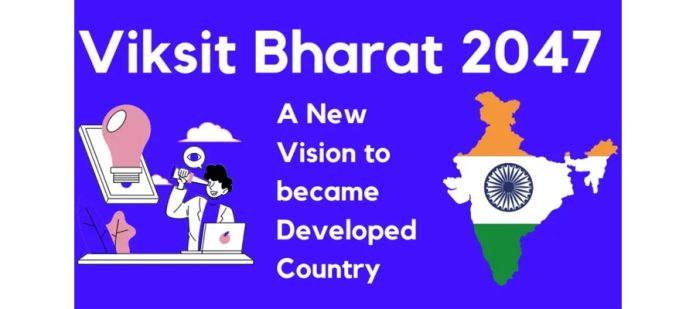Bharat continues to build strong ecosystem foundations to drive growth and carve new opportunities. The vision of ‘Viksit Bharat’ sentiment extends to the larger population envisioning the country excelling in global trade, technology, and the economy. Bharat is on a mission to constructively reform itself and harness its strengths. It seeks to propel itself toward a better future for its own people along with the betterment of all humanity.
Prime Minister Narendra Modi’s call to transform India into a developed nation by 2047 is backed by the strong confidence of 70 percent Indians coupled with continual all-round reforms. Backed by the civilisational ethos, Bharat is on a mission mode. The term ‘Viksit Bharat’ was unheard of a few days back. But now we seem to be committed and have started marching towards it.
Developed countries have advanced technological infrastructure, diverse industrial and service sectors, human development index, high per capita income, the general standard of living and technological infrastructure.
The prerequisite to be a developed Bharat requires one of the largest economies globally and a higher GDP per capita. Indicators show our country will be the third largest economy by 2027 and it needs to grow at rapid rates to become a $35 trillion economy by 2047.
Economic fundamentals make us believe Bharat could grow its economy at one of the fastest rates of any nation in the world for decades to come. Modi has declared that India will achieve developed country status by 2047. The international rating agency projections show that India could become the world’s third biggest economy as early as 2030 and have a GDP exceeding that of the US by 2060.
India is entering an exciting, but also uniquely challenging phase in its history. To realise its future ambitions, India must transition from a largely agrarian, informal economy to a services, advanced manufacturing, and knowledge-led hub, positioning itself to take full advantage of the world’s increasing technological sophistication and drive for sustainability. Rural Bharat also is fast getting connected to urban centres, bridging the gap of connectivity and infrastructure.
To further achieve inclusive sustainable economic growth Bharat should achieve profound transformation, aligning with major forces changing the game from tech disruption to decarbonisation. Bharat needs to find a way to harness more of its people’s creative energies, ensuring they have the skills and opportunities to propel the transformation.
There are some points that can propel India faster to developed country status. The transition from a high to a low carbon economy. Technology disruption will continue changing the game for all businesses, creating massive opportunities for those who can lead the shift – Bharat is a leader in digital transactions, biometric identification to 99% of its population, rolling out India’s first digital rupee pilot to name a few. India is building the infrastructure, Self-Reliant initiative, production-linked incentives – all to attract manufacturing and support domestic producers, speeding India’s progress toward being a global manufacturing and export hub. PLI incentives have been big draws for mobile phone and electronics manufacturers, making India one of the world’s biggest exporters of smartphones. India is well-positioned to attract companies seeking to diversify their global supply chains, spurring the growth of India’s industries.
The greater the number of people who can join the workforce, the faster the economy can grow. India can super-charge its rise if it taps into the productive capacities of more of its people. By 2030, India is projected to have the largest working-age population in the world that could see a huge ‘demographic dividend’ giving way to speedy economic growth.








